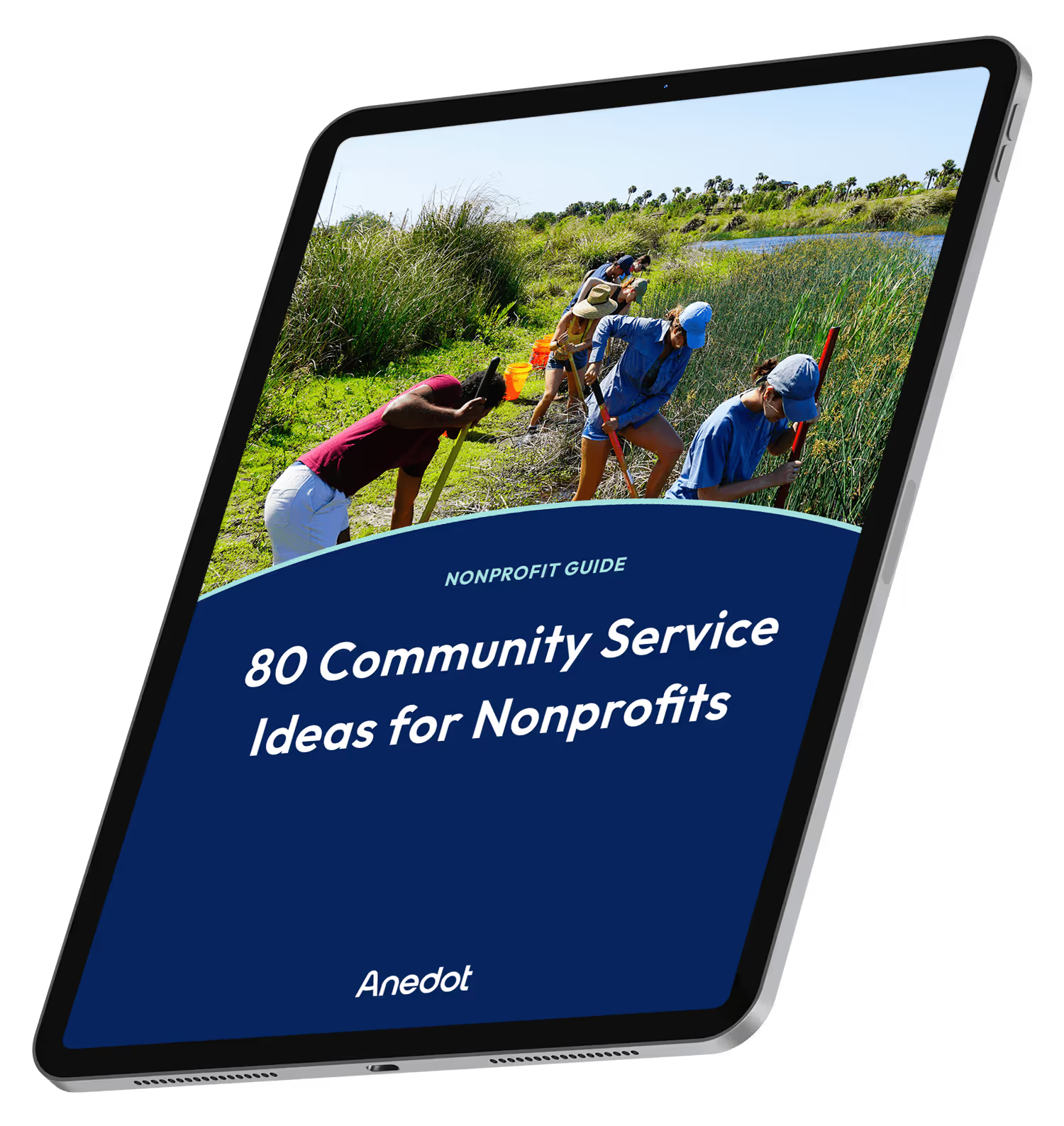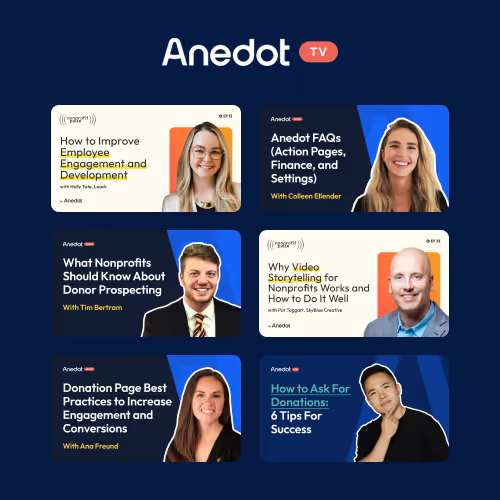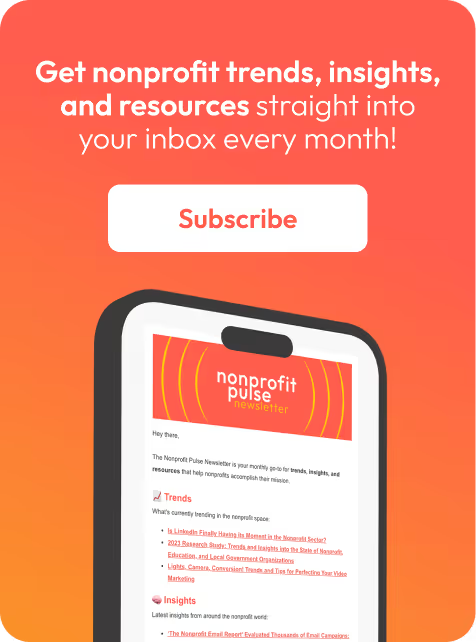Nonprofit branding conveys the heartbeat of your organization through text and visuals.
Your branding can attract, engage, and earn the support you need to realize your goals.
In our guide to nonprofit branding, you’ll learn the components of sustainable, scalable branding, and how effective branding drives your nonprofit to success.
What is nonprofit branding?

Branding is the way you tell your story.
Branding your nonprofit includes the visual and written methods of communication that explain who you are, what you do, and how and why you do it.
Branding includes logo, typography, and graphics. But it’s more than that.
Your nonprofit brand is an identity. And the stronger your brand identity, the better for your organization.
A robust branding identity allows you to acquire more resources and gives you freedom over how to allocate those resources.
As part of your nonprofit’s marketing strategy, your branding will play a role in strengthening engagement and support raising efforts.
It also empowers you to work toward your long-term goals: strengthening your internal identity, cultivating cohesion and unity among team members, and solidifying your social goals within your community of supporters and beneficiaries.
Branding plays a critical role in your nonprofit’s direction and success.
As such, your team must know how to effectively create and support your brand.
Below, we give you a step-by-step to create your nonprofit’s branding guidelines.
How to create branding guidelines

Brand guidelines incorporate key components of your brand, detailing who you are and what you want to be.
Your guidelines should include visual elements, like logo, font, and color choices, as well as your tone and the language you use to talk about your nonprofit.
Keep in mind that your branding will evolve as your organization grows and changes.
Create your branding guidelines on a living document, and update the information as needed.
Step 1: Create a brand story
A crucial component of any nonprofit communication strategy is telling the brand story.
Your story comprises everything you want supporters and potential supporters to know about your organization.
To begin, write down the specifics of who and what your nonprofit is and does.
What do you want to be known for, and what picture do you want to paint when people read about you?
Communicate the facts of who you are with descriptive language that matches the tone of your brand.
Your story allows you to connect with an individual’s heart, endearing them to your cause and showing them why they should care about the work you do.
As you write your brand story, choose vocabulary and voice that will capture your audience’s attention and compel them to act.
Step 2: Choose colors and fonts
Once you’ve established your brand story, you can begin pulling together the fonts and colors that best communicate that story visually.
Color theory is nothing new in branding, and for good reason.
We respond to different colors in specific and unique ways.
For example, green is nearly always used in environmental campaigns or in projects centered around nature and growth.
Blue is a calming color, often utilized in medical branding and materials.
Red communicates a sense of urgency or passion and is often used to trigger impulse decisions.
The same ideas can be conveyed through the fonts you choose.
Sans-serif fonts with rounded corners come can portray your brand as friendly and approachable.
Fonts with sharp angles communicate a seriousness that some nonprofits want to adopt.
Understanding fonts and colors allows you to then create –– or even update –– your logo to capture the essence of your nonprofit.
Your organization’s logo should be simple yet unique so people can easily recognize it regardless of the context.
Pro-tip: Use Adobe's Font Logo Maker to create a font logo for free in just minutes!
Step 3: Create a brand kit
After you’ve solidified the story, colors, and fonts, create a brand kit.
This is a set of rules regarding your brand and includes instructions for how your branding may be applied.
Branding kits are crucial for branding efficacy.
Consistency is one of the most important elements of branding.
Consistent branding earns trust, cultivates familiarity, and has the potential to increase revenue by up to 20 percent.
Your brand kit ensures that no matter where your nonprofit is mentioned, the same branding will be used every time.
Best nonprofit branding practices

With your branding guidelines in place, you’re ready to begin branding your nonprofit.
Branding is crucial in any industry, but there’s a lot on the line for nonprofits.
Because most nonprofits depend on donor support, it’s important to create a brand that is true to your organization and can withstand applications for multiple purposes, including awareness, fundraising, and impact.
Below we give you our nonprofit branding best practices.
1. Audience research
While you might have ideas and visions of how you want to brand your nonprofit, you must present yourself in a way that will attract, engage, and compel your target audience.
To learn what that looks like, conduct audience research.
Poll your audience to understand their expectations of your organization. Have them read your brand story and ask for their honest thoughts.
Audience feedback will give you insights that allow you to further shape and refine your branding.
Observing similar nonprofits will also help you determine your own identity.
Evaluate their branding, what works, and what doesn’t, and let their direction shape your own.
Conduct research regularly so you can effectively shape your branding to get the results you desire.
Audiences are ever-changing; your brand should remain relevant as audience preferences and desires shift.
2. Highlight success stories
Your nonprofit brand comprises more than the work you do; the people you serve are part of your identity, too.
Highlighting success stories is one of the most effective ways to engage with new and existing supporters as well as provide proof of your positive impact.
As you showcase successes, use visual storytelling to build your brand.
Seeing the faces and even hearing the voices of your beneficiaries connects with donors in an intimate way. They see the impact of their dollars in these individuals.
Highlighting success stories is an effective way to not only build your brand, but to further engage with donors as well.
3. Use infographics
Infographics allow you to communicate a lot of information in an easily consumable format.
You can showcase growth, need, impact, and more, all on a single page.
Infographics not only convey the facts, but they also tap into the emotional aspect of your branding.
Additionally, infographics are ideal for content repurposing.
You can send infographics to supporters through targeted emails, publish them to your site, and make them shareable on your socials.
They’re an agile branding and marketing tool that effectively engage and educate.
Closing thoughts

Your branding is an essential component of audience engagement and donor support.
At Anedot, we know the work our nonprofits put in to empower communities to thrive. We also know that to run a successful nonprofit, you rely on the generosity of your donors.
That’s why we’re here to help.
Anedot has the tools and resources you’re looking for to streamline donations and fundraising.
Reach out to our team today to learn how Anedot serves nonprofits just like yours!

80 Community Service Ideas for Nonprofits























